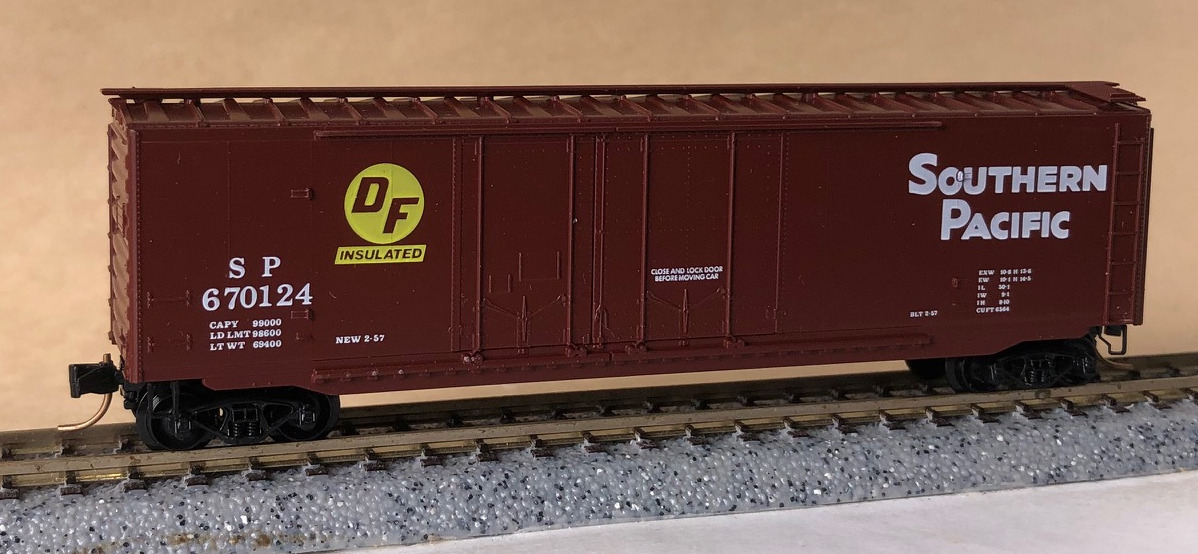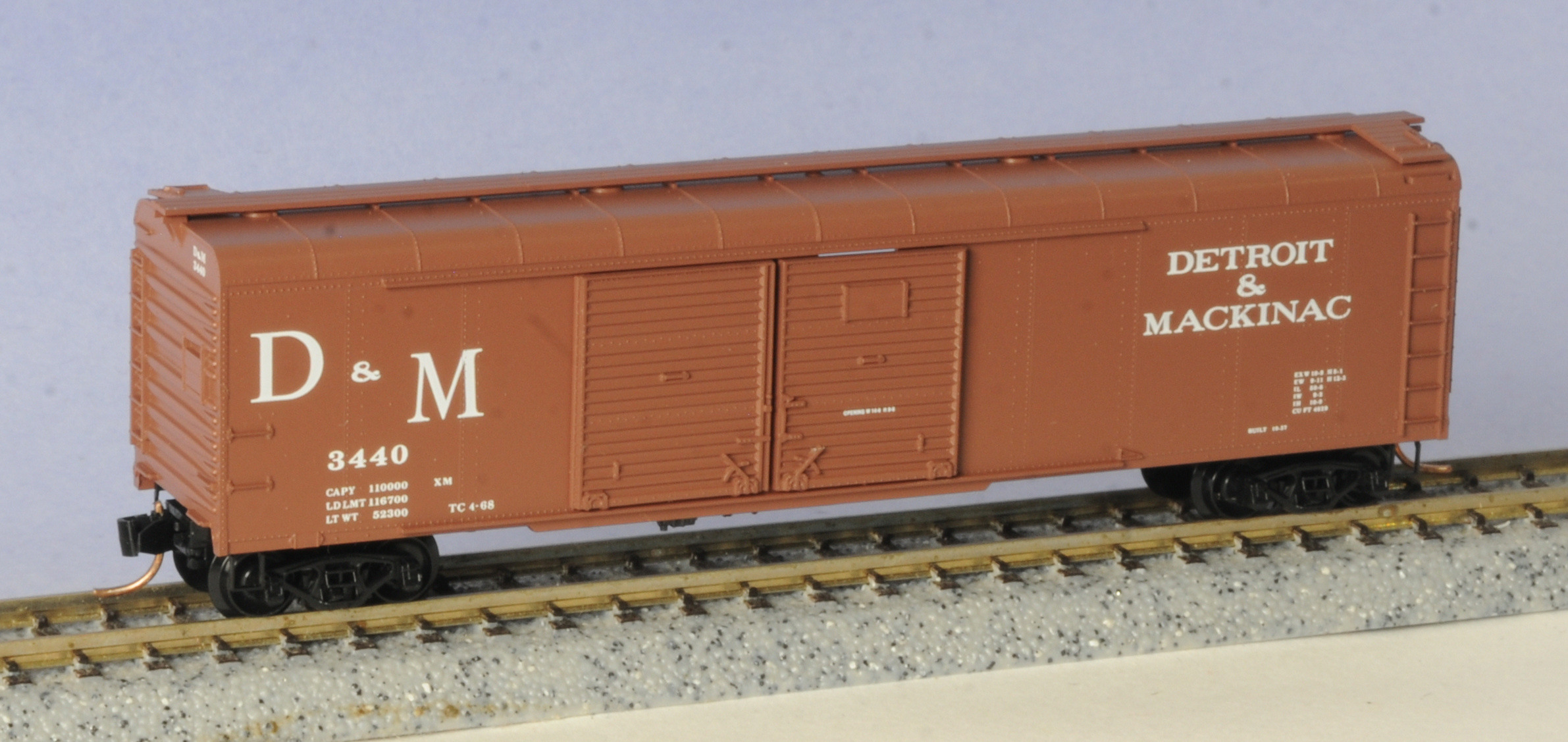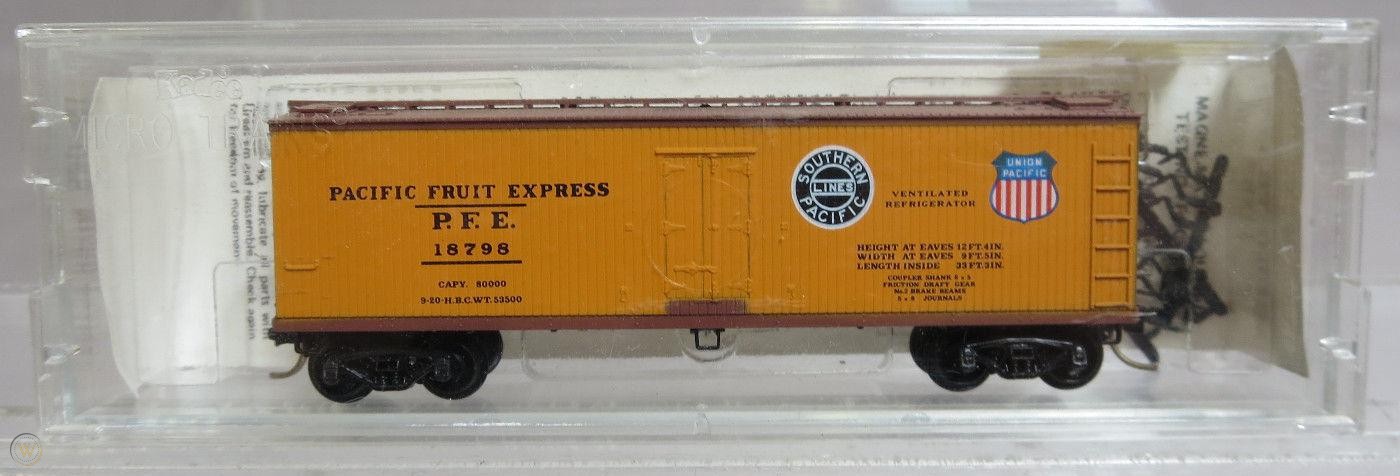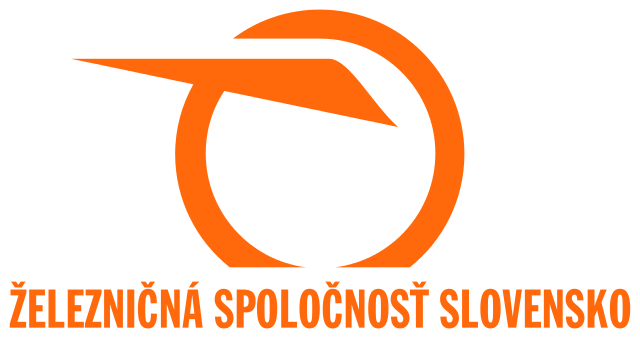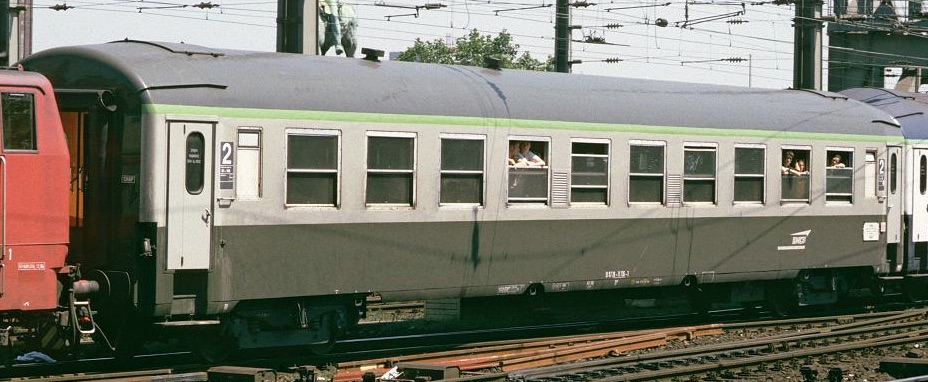Minitrix - 15696 - Passenger Car, UIC, Type Y - ČD (Czech Railways) - 51 54 20-41 533-8
| Stock Number | 15696 |
| Original Retail Price | 39.99€ |
| Brand | Minitrix |
| Manufacturer | Minitrix |
| Body Style | Minitrix Passenger DR type Y |
| Prototype Vehicle | Passenger Car, UIC, Type Y (Details) |
| Road or Company Name | ČD (Czech Railways) (Details) |
| Reporting Marks | ČD |
| Road or Reporting Number | 51 54 20-41 533-8 |
| Paint Color(s) | Green and White |
| Print Color(s) | Black |
| Coupler Type | Rapido Hook NEM Standard Pocket |
| Coupler Mount | Truck-Mount |
| Wheel Type | Chemically Blackened Metal |
| Wheel Profile | Small Flange (Low Profile) |
| Release Date | 2016-07-01 |
| Item Category | Passenger Cars |
| Model Type | European |
| Model Subtype | OSShD-Y/B-70 |
| Model Variety | 2nd class Coach (B) |
| Prototype Region | Europe |
| Prototype Era | EU Epoch III (1945 - 1970) |
| Years Produced | 1961-1976 |
| Scale | 1/160 |
| EAN/JAN/GTIN13 Number | 4028106156960 |
Model Information:
This generic body style comprises 1st class (A), 2nd class (B), 1st/2nd class (AB) or 2nd class/Baggage (BD) cars of type OSShD-Y or OSShD-Y/B-70, designed by eastern German railways (DR) based on UIC-Y type.
Can be equipped with internal lighting Minitrix ref. 66656 or 66616 (LED)
Can be equipped with internal lighting Minitrix ref. 66656 or 66616 (LED)
Prototype History:
The UIC (Union International des Chemins de fer) type Y is a type of passenger car defined in UIC bulletin 567 together with UIC type X. Initially ordered by the Italian Ferrovie dello Stato (FS), with 24 manufactured, they have primarily been produced for the French SNCF with 1,327 manufactured from 1963 to 1976.
The East German railways (DR) derived their OSJD/OSShD type B cars to deliver from 1966 to 1970 a new series close to the UIC-Y, and then from 1969 a series of type Y/B 70 that is compatible to UIC-Y standards. These Eastern German cars have been acquired by several railways of Eastern Europe: : Czechoslovakia (ČSD), Poland (PKP), Hungary (MÁV), Bulgaria (BDŽ), Romania (CFR).
The east-German UIC-Y cars have a higher roof than the French and Italian ones.
From Wikipedia (in French)
See also these detailed articles (in Italian) for more information about both the prototypes and the N scale models: UIC-Y and UIC-Y from SNCF.
The East German railways (DR) derived their OSJD/OSShD type B cars to deliver from 1966 to 1970 a new series close to the UIC-Y, and then from 1969 a series of type Y/B 70 that is compatible to UIC-Y standards. These Eastern German cars have been acquired by several railways of Eastern Europe: : Czechoslovakia (ČSD), Poland (PKP), Hungary (MÁV), Bulgaria (BDŽ), Romania (CFR).
- Ferrovie dello Stato (FS): 20 Az (1st class), 1 ABz, 1 Bz, 1 AcBcz and 1 Bcz;
- French National Railway Corporation (SNCF): 185 A9 (1st class), 43 A7D (1st class + Baggage), 53 A4B5 (1st/2nd class), 305 B10 (2nd class), 118 B5Dd2 (2nd class + Baggage), 175 A4c4B5c5x (1st/2nd class sleeper), 448 B9c9x (2nd class sleeper);
- Eastern Germany Railways (DR) - type Y : 22 Age (1st class), 66 ABge (1st/2nd class), 142 Bge (2nd class)
- Czech Railways (ČSD) - type Y/B 70 : 43 Ame (1st class), 60 Bme (2nd class), 7 BDmse (2nd class + Baggage).
The east-German UIC-Y cars have a higher roof than the French and Italian ones.
From Wikipedia (in French)
See also these detailed articles (in Italian) for more information about both the prototypes and the N scale models: UIC-Y and UIC-Y from SNCF.
Road Name History:
České dráhy, often shortened to ČD (English: Czech Railways), is the main railway operator in the Czech Republic providing regional and long-distance services.
The company was established in 1993, after the dissolution of Czechoslovakia, as a successor of the Czechoslovak State Railways.
With a fleet of more than 2,500 motive vehicles, it operates on the national infrastructure managed by SŽDC, a network of circa 9,400 km of railway lines.
The company was established in 1993, after the dissolution of Czechoslovakia, as a successor of the Czechoslovak State Railways.
With a fleet of more than 2,500 motive vehicles, it operates on the national infrastructure managed by SŽDC, a network of circa 9,400 km of railway lines.
Brand/Importer Information:
Trix is a German company that originally made Trix metal construction sets. one of its co-founders was Stephan Bing, the son of the pioneer toy-maker industrialist Ignaz Bing. In 1935 the company began producing the electrically powered model trains that it became famous for, under the Trix Express label. Prior to the outbreak of World War II the Trix company produced a small range of fairly unrealistic AC powered three rail models running at 14 volts.
N gauge models under the Minitrix brand were made from the late 1960s mostly of European prototypes (German and British primarily). North American prototypes were also manufactured and marketed under the Aurora "Postage Stamp" brand; later these items were sold under the American Tortoise, Model Power and Con-Cor brands. Trix sometimes utilized North American consultants to aid in the design of this portion of the product line. The "Hornby Minitrix' brand was used in the 1980s for a short lived range of British outline models using the earlier product tooling.
Trix's owner in the 1980s and 1990s was Mangold, which went bankrupt in the late 1990s and Märklin purchased the assets in January 1997. In part, this purchase was a reflection of Märklin's need for added production capacity; Trix had been manufacturing certain items for Märklin in previous years. The purchase was also in response to the earlier purchase of the Karl Arnold company by the Italian company Rivarossi; Märklin were very keen to take over Trix market share in 2-rail H0 and especially Minitrix, until then Märklin had not marketed N gauge models. In 2003, Märklin introduced its first N gauge models under the well established Minitrix brand. A number Märklin H0 scale three-rail AC locomotives have also been introduced in two-rail DC versions under the Trix logo and many models are shared between the two brands.
From Wikipedia
N gauge models under the Minitrix brand were made from the late 1960s mostly of European prototypes (German and British primarily). North American prototypes were also manufactured and marketed under the Aurora "Postage Stamp" brand; later these items were sold under the American Tortoise, Model Power and Con-Cor brands. Trix sometimes utilized North American consultants to aid in the design of this portion of the product line. The "Hornby Minitrix' brand was used in the 1980s for a short lived range of British outline models using the earlier product tooling.
Trix's owner in the 1980s and 1990s was Mangold, which went bankrupt in the late 1990s and Märklin purchased the assets in January 1997. In part, this purchase was a reflection of Märklin's need for added production capacity; Trix had been manufacturing certain items for Märklin in previous years. The purchase was also in response to the earlier purchase of the Karl Arnold company by the Italian company Rivarossi; Märklin were very keen to take over Trix market share in 2-rail H0 and especially Minitrix, until then Märklin had not marketed N gauge models. In 2003, Märklin introduced its first N gauge models under the well established Minitrix brand. A number Märklin H0 scale three-rail AC locomotives have also been introduced in two-rail DC versions under the Trix logo and many models are shared between the two brands.
From Wikipedia
Item created by: Alain LM
on 2019-04-07 04:30:23
Last edited by: CNW400 on 2020-08-20 11:04:52
If you see errors or missing data in this entry, please feel free to log in and edit it. Anyone with a Gmail account can log in instantly.
Last edited by: CNW400 on 2020-08-20 11:04:52
If you see errors or missing data in this entry, please feel free to log in and edit it. Anyone with a Gmail account can log in instantly.







